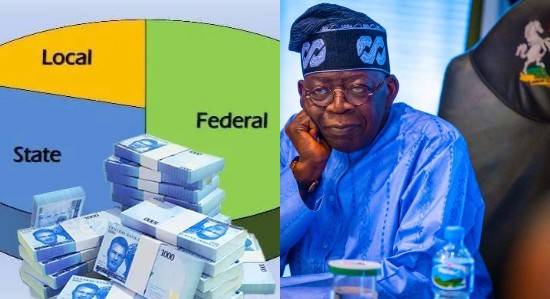The Federation Account Allocation Committee (FAAC) has distributed a whopping ₦1.424 trillion as revenue for December 2024 among the federal, state, and local governments. This record-breaking allocation was announced in January 2025, reflecting Nigeria’s ongoing commitment to equitable resource sharing across the tiers of government.
Breakdown of the FAAC Distributed Revenue
The ₦1.424 trillion allocation comprises several key revenue streams, showcasing the government’s diverse income sources. Statutory Revenue accounted for ₦386.124 billion, while Value Added Tax (VAT) contributed the highest share with ₦604.872 billion. Additionally, the Electronic Money Transfer Levy (EMTL) generated ₦31.211 billion, and Exchange Difference Revenue added ₦402.714 billion to the total.
Allocations to each tier of government were proportionally distributed. The Federal Government received ₦451.193 billion, while State Governments were allocated ₦498.498 billion. Local Government Councils received ₦361.754 billion, and oil-producing states benefitted from ₦113.477 billion in derivation revenue.
Comparative Revenue Analysis
The gross revenue available for December 2024 was ₦2.310 trillion. However, deductions amounting to ₦84.780 billion for the cost of revenue collection and ₦801.175 billion for transfers and refunds significantly reduced the distributable amount.
Notably, December’s statutory revenue (₦1.226 trillion) marked a ₦600.988 billion decrease from November’s ₦1.827 trillion. On the other hand, VAT revenue showed resilience, increasing by ₦20.588 billion to ₦649.561 billion compared to the previous month.
Increased FAAC Revenue but Declining Oil Contributions
December 2024 highlighted a shifting revenue composition for Nigeria. VAT and EMTL revenues saw significant growth, reflecting the success of reforms aimed at diversifying the economy. However, there were marked declines in income from Oil and Gas Royalty, CET Levies, Excise Duty, Import Duty, Petroleum Profit Tax (PPT), and Companies Income Tax (CIT). This underscores the need for sustainable economic strategies as Nigeria navigates fluctuating oil market dynamics.
State Allocations and Their Utilization
In 2024, FAAC allocations to states surged, partly driven by the removal of fuel subsidies. States received a combined ₦1.48 trillion in the third quarter alone, with five states receiving over ₦50 billion each, 15 states receiving between ₦30 billion and ₦50 billion, and 17 states receiving between ₦20 billion and ₦30 billion.
Despite these substantial funds, concerns persist over mismanagement at the state level. Reports indicate that many local governments, which received a combined ₦2.67 trillion in nine months, continue to face poor infrastructure and widespread poverty. This is often attributed to state governors exercising excessive control over local government funds, limiting grassroots development.
The Supreme Court Ruling on Local Government Funds
In a landmark ruling in July 2024, the Supreme Court mandated that local government allocations be paid directly into their accounts, bypassing state governments. However, as of late 2024, implementation of this directive has been delayed, leaving local governments reliant on state administrations for funding.
This delay hampers efforts to enhance grassroots governance and accountability. Direct allocation would empower local governments to address pressing infrastructure and social challenges without interference.
Revenue Contributions and Fiscal Disparities
The disparity in revenue contributions among states remains a critical issue. While states with strong internal revenue systems contribute significantly to the federal purse, others rely heavily on FAAC allocations despite contributing minimally.
This imbalance highlights the urgent need for fiscal reforms to ensure equitable development. Improved financial management and accountability at the state level are essential to translating these allocations into tangible benefits for citizens.
The Tinubu administration’s increased financial allocations to FAAC in 2024 reflect its commitment to national development. However, the effective utilization of these funds remains a pressing challenge. Ensuring transparency and accountability in resource management is crucial to fostering economic growth and improving the quality of life for all Nigerians.
Table of Contents
Discover more from OGM News NG
Subscribe to get the latest posts sent to your email.














